Introduction
Gambling addiction, also known as compulsive gambling, is a serious disorder that affects millions globally, with profound personal and social implications. Understanding how to support a loved one dealing with this addiction can be challenging but is crucial for their recovery. This guide aims to provide comprehensive insights into recognizing signs of gambling addiction, initiating conversations, supporting your loved ones, and ensuring you maintain your own well-being throughout the process.
Understanding Gambling Addiction as a Mental Health Issue
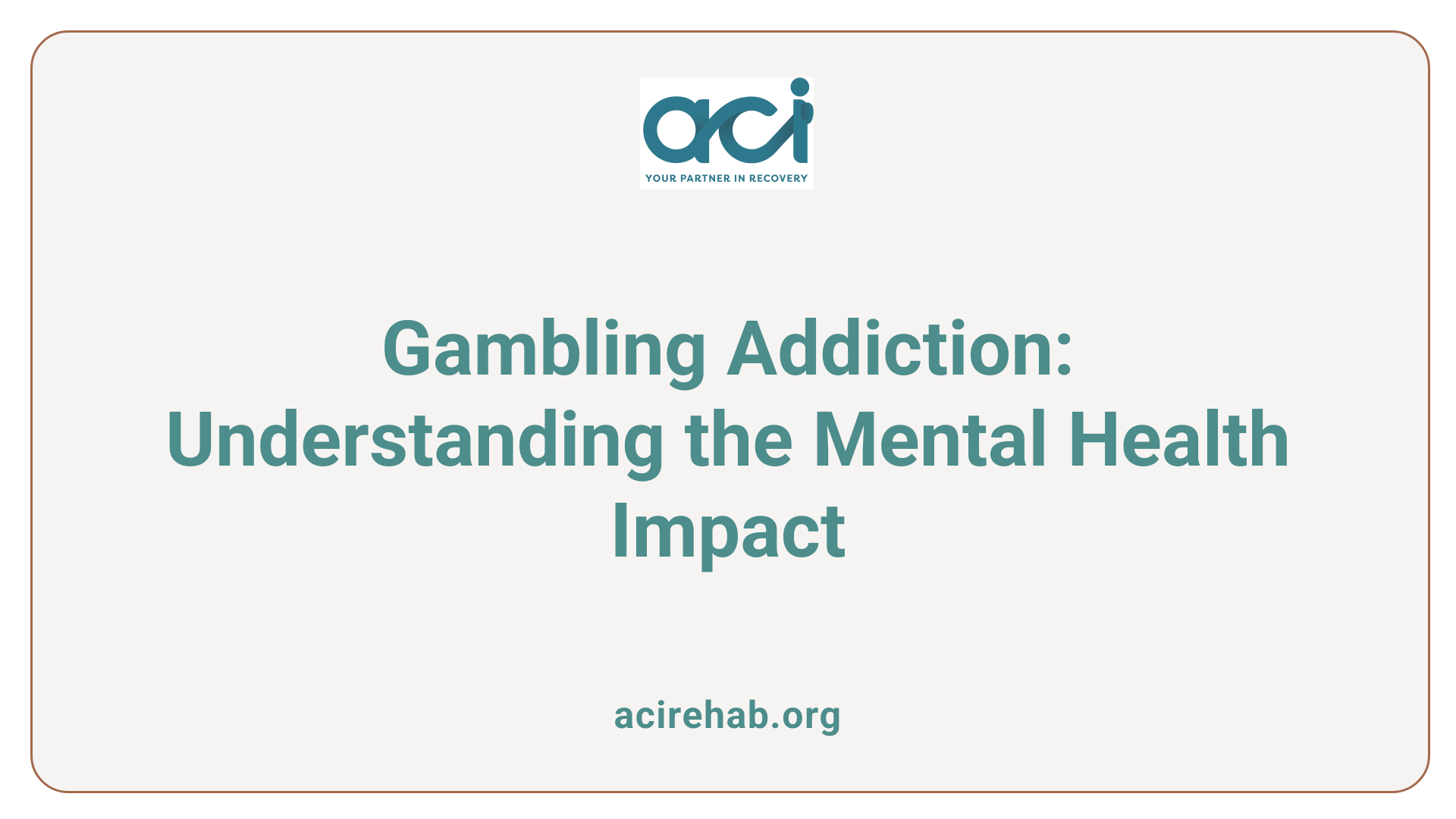
Is gambling a mental health problem?
Gambling can indeed be regarded as a mental health problem when it escalates into addiction, often termed compulsive gambling. This condition negatively affects an individual’s well-being, relationships, and financial status, often leading to feelings like low self-esteem, anxiety, and depression.
Compulsion and its impacts
The compulsion to gamble can stem from various factors, including family history, early exposure to gambling, and specific personality traits. Once established, this addiction overrides personal priorities, with individuals often neglecting responsibilities and relationships in favor of gambling. Signs to look for include a preoccupation with gambling, increased betting amounts to sustain excitement, and gambling behavior masked by secrecy.
Brain chemistry and addiction
At a neurological level, gambling addiction alters brain chemistry, similar to other behavioral addictions. This change makes it increasingly challenging for individuals to experience pleasure from non-gambling activities. As a result, they may continuously seek the rush associated with gambling, which reinforces the cycle of addiction.
Additional Resources
| Resource Type | Description | Contact Information |
|---|---|---|
| Helpline | National Problem Gambling Helpline | 1-800-GAMBLER |
| Support Groups | Community support through Gamblers Anonymous | Local chapters available |
| Professional Therapy | Cognitive Behavioral Therapy and other mental health services | Contact local providers |
Effective treatments, including Cognitive Behavioral Therapy, are available, along with various support resources to help individuals manage their gambling addiction and associated mental health effects.
Identifying Signs and Symptoms of Gambling Addiction
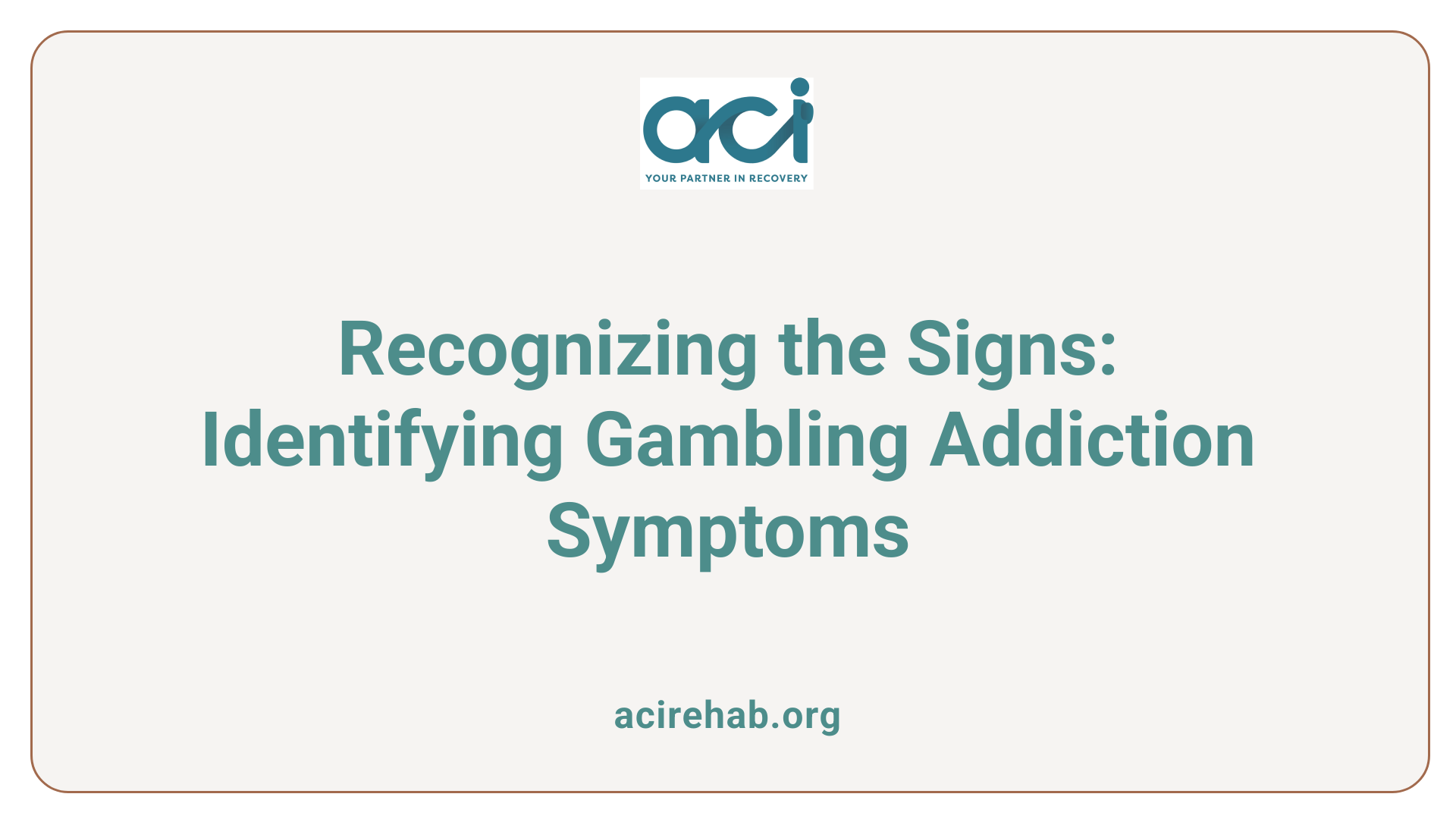
What are the signs and symptoms of gambling addiction?
Signs and symptoms of gambling addiction can manifest in various ways, impacting the individual’s life profoundly. Key indicators include:
- Preoccupation with Gambling: The individual may constantly think about gambling, planning the next bet or reliving past gambling experiences.
- Increased Betting Amounts: A noticeable need to wager larger sums of money to achieve the same thrill, which may indicate escalating addiction.
- Failed Attempts to Control Gambling: Repeated unsuccessful efforts to stop gambling despite recognizing the problem.
- Withdrawal Symptoms: Feelings of irritability or restlessness when attempting to cease gambling activity.
Emotional and financial impacts
Gambling addiction exert a significant toll on both emotional and financial health. Individuals often find themselves trapped in a cycle of chasing losses, leading to:
- Serious Financial Difficulties: Depleting savings, accruing debt, or engaging in illegal activities to fund gambling.
- Strained Relationships: Deceit regarding gambling habits can damage trust among family and friends and lead to isolation.
- Emotional Turmoil: Feelings of guilt, anxiety, and depression can proliferate, especially when gambling harms loved ones, causing distress.
Attempts to conceal gambling activities
A common behavior noted in those with gambling disorders is attempting to hide their gambling activities. This can involve:
- Lying About Gambling: Individuals may fabricate stories or downplay their gambling habits to family and friends.
- Secretive Financial Transactions: Concealing financial losses or using funds meant for essentials to gamble.
- Social Withdrawal: Avoiding activities or gatherings to gamble, further alienating themselves from support networks.
Overall, gambling addiction disrupts various facets of life, requiring focused intervention and a supportive environment to foster recovery.
Treatment Options for Gambling Addiction
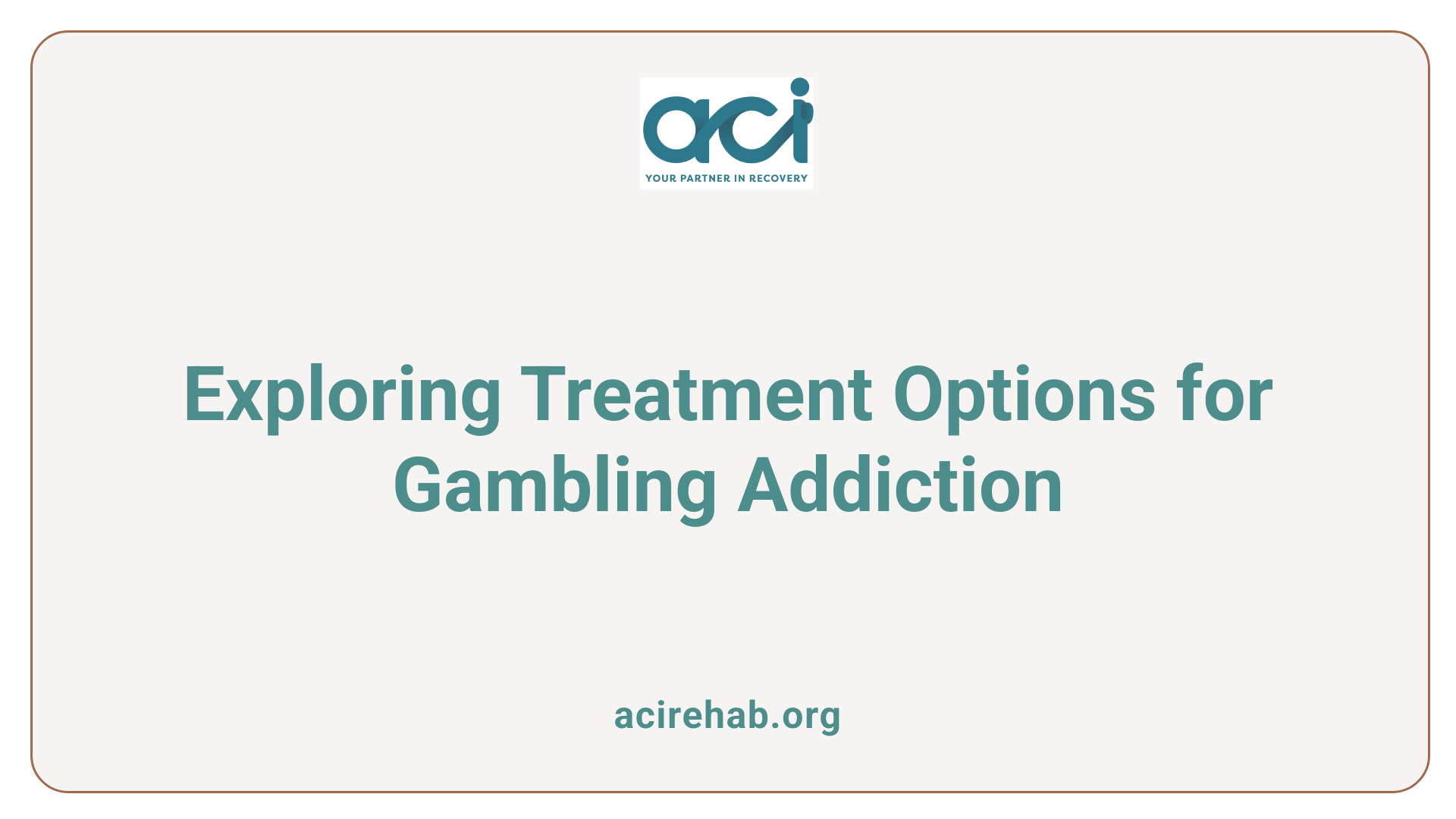
What is the most common treatment for gambling addiction?
The most common treatment for gambling addiction is Cognitive Behavioral Therapy (CBT). This therapy targets the identification and alteration of negative thoughts and behaviors surrounding gambling, equipping individuals with effective coping strategies. CBT plays a crucial role in helping those affected to manage urges and reduce the risk of relapse.
In some cases, medication might complement therapy. Antidepressants or mood stabilizers can assist in alleviating symptoms of co-occurring mental health disorders, further aiding recovery.
Psychotherapy treatments
Beyond CBT, other forms of psychotherapy, including motivational interviewing, also facilitate engagement by exploring personal motivations and readiness for change. Such approaches help gamblers contemplate the impact of their behavior, making treatment a collaborative process.
Medication and support groups
Support groups like Gamblers Anonymous provide a vital element of recovery. These groups foster community and shared experiences, allowing individuals to learn from others in similar situations. They offer a safe space to discuss challenges and successes while providing ongoing motivation.
Role of family and friends in recovery
Family and friends play an indispensable role in the recovery journey. Their support can lead to increased accountability, encouragement in pursuing professional help, and a secure emotional environment. When loved ones actively participate in treatment processes—whether through family therapy or support at group meetings—they help reinforce positive changes which are instrumental in recovery.
Involving trusted individuals in treatment discussions creates a comprehensive support network, ensuring a greater chance for long-lasting recovery from gambling addiction.
Effective Communication: Supporting a Loved One With Gambling Issues
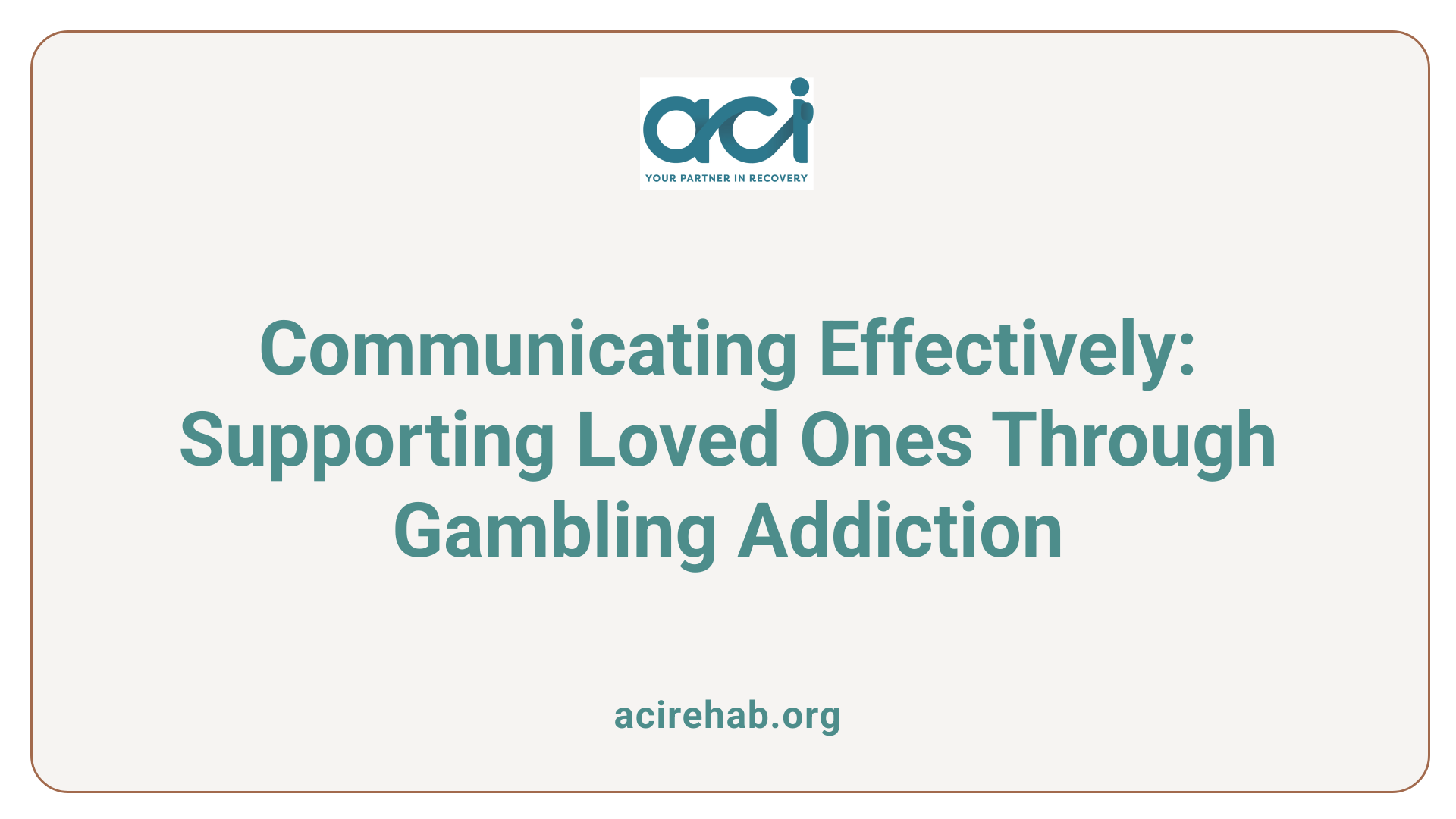
Encouraging Open Communication
To effectively support a loved one dealing with gambling addiction, open discussions are vital. Create a safe space where they can freely express their feelings about their gambling behavior without fear of judgment. Use "I" statements to express your concerns, such as, "I feel worried when I see you gambling and it affects our finances." This approach assures them that your motivation is concern rather than blame.
Creating a Non-Judgmental Environment
Establishing a non-judgmental environment helps in fostering honesty. Be patient and listen actively, showing empathy towards their struggles and encouraging them to open up. Understanding that feelings of shame might hinder their willingness to talk is important; reassure them that help is available and that they can overcome their addiction without facing criticism.
Addressing Financial and Emotional Concerns
Addressing the emotional and financial aspects of gambling addiction is essential. Aid them in connecting with professional help like counseling or support groups. Implement financial management strategies, such as creating a family budget to regulate spending patterns. Assure your loved one that it’s okay to seek help for both emotional distress and financial issues, and explore resources that can assist in protecting family assets. Remember, maintaining your emotional health is equally important, so don’t hesitate to lean on trusted friends or family for support while navigating these challenges together.
By combining open communication with careful management of both finances and emotions, families can foster an environment that supports recovery and healing.
Taking Care of Yourself While Helping Someone with a Gambling Problem
How can you maintain your well-being while helping someone with a gambling problem?
Maintaining your well-being while supporting someone with a gambling problem is vital for both your health and the effectiveness of your support. Here are several strategies:
-
Set Boundaries: It’s crucial to establish clear personal boundaries to protect your emotional and financial well-being. Be firm about what you can handle and don’t shield them from the consequences of their actions.
-
Seek Support: Don’t hesitate to reach out for help. Talk to trusted friends or family members about your feelings and concerns. Consider joining support groups like Gam-Anon to connect with those who understand your situation.
-
Engage in Self-Care Practices: Prioritize your physical and mental health through proper nutrition, regular exercise, and sufficient rest. These practices foster resilience and better equip you to support your loved one.
-
Educate Yourself: Understanding gambling addiction can enhance your effectiveness in providing support. Learn about its signs, symptoms, and treatment options to navigate the challenges better.
-
Practice Open Communication: Maintain transparent discussions with your loved one about how their gambling impacts you and the family. Express your concerns using "I" statements, fostering a supportive environment.
Key Practices for Well-Being
| Strategy | Description | Benefits |
|---|---|---|
| Set Boundaries | Define what you will and won’t tolerate | Protects emotional health |
| Seek Support | Reach out to friends or support groups | Provides emotional relief |
| Engage in Self-Care | Prioritize personal health with diet, exercise, and rest | Enhances resilience |
| Educate Yourself | Learn about gambling addiction | Builds understanding |
| Practice Open Communication | Share feelings without blame | Encourages dialogue |
By applying these practices, you’ll be better equipped to help your loved one while ensuring your own well-being is prioritized.
Initiating Conversations about Gambling Addiction
How to start a conversation about gambling addiction?
To engage someone in conversation about their gambling, approach them non-confrontationally and express concern based on observations rather than accusations. Choosing a calm and private setting is vital; this ensures that both parties can speak freely without distractions. It’s essential to address your concerns sooner rather than later, as delaying the conversation may allow the problem to escalate.
Prepare for a range of emotional responses—denial, anger, or sadness. Staying calm and compassionate will help cultivate an environment where the person feels safe to share. Use ‘I’ statements to articulate how their gambling impacts you rather than making accusations; this method fosters open communication and helps keep defensiveness at bay.
Highlight the importance of empathy in these discussions, particularly due to the stigma and shame often associated with gambling addiction. Many individuals hide their struggles out of fear of judgment, so reiterating that you care and are there to support them can help break down barriers. Prioritize creating a safe space where they can express themselves without fear of judgment—it can make all the difference in opening the door to recovery.
Building a Support Network
What role does a support network play in recovery from gambling addiction?
Building a support network for someone dealing with gambling addiction is crucial as it enhances the chances of successful recovery. Support groups like Gamblers Anonymous provide peer encouragement, while family and friends offer emotional and financial support, creating a safety net for the individual.
Participation in these groups fosters a sense of community, reduces isolation, and allows individuals to share experiences and coping strategies. Being surrounded by people who understand the struggles of gambling addiction can significantly boost one’s motivation to seek help and remain accountable.
Engaging with Trusted Individuals
Involving trustworthy friends or family in the recovery process is essential. They can provide practical support, such as helping manage finances and preventing exposure to gambling triggers. Encouraging open conversations can also help address the affected person’s feelings and responsibilities regarding their behavior.
Moreover, these trusted individuals often act as a reminder that the individual does not face their battle alone.
Family Involvement in Recovery
Families play a vital role in the recovery process. They can set boundaries to discourage enabling behavior, reinforcing the need for responsible decisions. Additionally, family education about gambling addiction helps them understand their loved one’s challenges better. This collective effort can lead to healthier dynamics and establish a supportive home environment, crucial for recovery and rebuilding trust.
Strategies for Long-term Support and Recovery
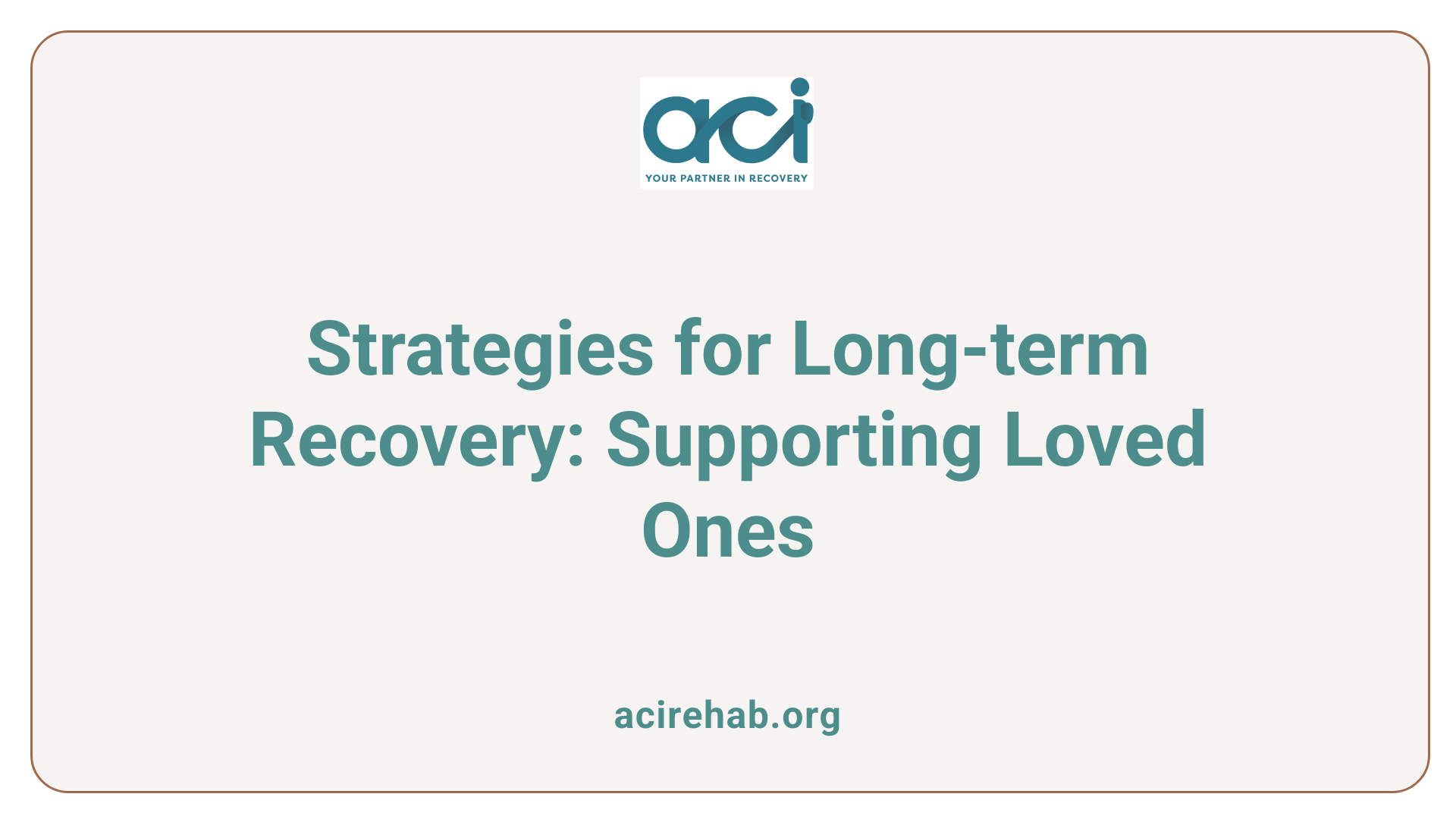
How to support long-term recovery in gambling addiction?
Supporting long-term recovery from gambling addiction involves several tailored strategies aimed at building resilience against potential setbacks.
Preventing Relapses: Relapses can happen, but acknowledging that they are a part of the recovery process is vital. Encourage the individual to identify and analyze personal triggers, such as social environments or emotional stressors, to help avoid tempting situations. Employing coping strategies like delaying or seeking support when feelings urge gambling can also be beneficial.
Celebrating Small Victories: Recognizing and celebrating even small milestones reinforces commitment to recovery. Whether it’s a week without gambling or attending a support group, these achievements boost self-esteem and motivation. Simple celebrations can remind the individual of their progress and encourage them to continue on the path to recovery.
Setting Realistic Goals: Establishing short-term and long-term goals provides clear direction and keeps the person focused on recovery. Goals should be achievable and realistic, which helps maintain momentum and allows time for adjusting strategies if necessary. A supportive network of family and friends plays a crucial role in keeping these goals in sight, fostering a collaborative environment that strengthens recovery efforts.
Conclusion
Supporting a loved one through gambling addiction is a significant undertaking that calls for patience, empathy, and comprehensive strategies. Recognizing the signs of addiction, encouraging open dialogues, and fostering a supportive and reliable network are key steps in assisting someone towards recovery. Equally important is the consideration of your own mental and emotional health as you provide this support. Accessing professional resources, engaging in self-care, and maintaining transparency in communication can ensure both parties are equipped to face the challenges together, resulting in healthier relationships and a hopeful pathway to recovery.
References
- How to Help Someone You Know That Has a Gambling Problem
- Gambling – advice for family and friends – Better Health Channel
- How to Help Someone with Gambling Addiction | Gambler’s Help
- Helping Someone Who Has Problems With Gambling – Gamble Aware
- How to talk to someone about their gambling – Gambler’s Help
- About the National Problem Gambling Helpline
- Gambling Addiction and Problem Gambling – HelpGuide.org
- Tips for How to Help Someone with a Gambling Addiction

